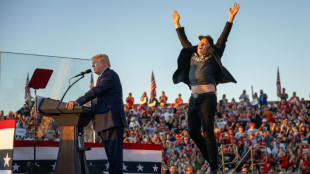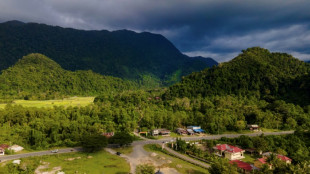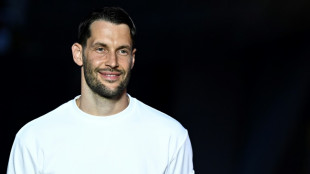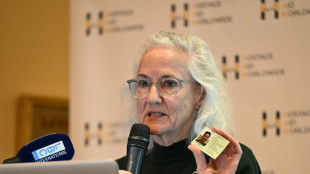
-
 Man City sign Uzbekistan defender Khusanov from Lens
Man City sign Uzbekistan defender Khusanov from Lens
-
Trump says 'only two genders', will end diversity programs

-
 US to withdraw from Paris agreement, expand drilling
US to withdraw from Paris agreement, expand drilling
-
Flick expecting Barca improvement at Benfica after Liga slump

-
 Trump says to declare national emergency, use military at Mexico border
Trump says to declare national emergency, use military at Mexico border
-
Tech billionaires take center stage at Trump inauguration

-
 Trump pledges 'golden age' on being sworn in as US president
Trump pledges 'golden age' on being sworn in as US president
-
Global tourism recovered to pre-pandemic levels in 2024: UN

-
 Trump to end diversity programs, define two genders: official
Trump to end diversity programs, define two genders: official
-
Job cuts report worries employees at Germany's Commerzbank

-
 Trump sworn in for second term vowing sweeping change
Trump sworn in for second term vowing sweeping change
-
Armani eyes 'beautiful comfort' at Milan fashion week

-
 Slot challenges Liverpool striker Nunez to prove he is elite
Slot challenges Liverpool striker Nunez to prove he is elite
-
Trump arrives for inauguration vowing sweeping change

-
 X and Facebook toughen EU pledge to combat hate speech
X and Facebook toughen EU pledge to combat hate speech
-
With Trump inauguration indoors, supporters say 'winging it' but still thrilled

-
 'Y.M.C.A.' journeys from gay anthem to Trump theme tune
'Y.M.C.A.' journeys from gay anthem to Trump theme tune
-
Hamilton begins 'new chapter' at Ferrari

-
 Trump, Biden head to Capitol for inauguration
Trump, Biden head to Capitol for inauguration
-
Numbers using 'QuitX' service swell before Trump inauguration

-
 French mother on trial accused of starving teen daughter to death
French mother on trial accused of starving teen daughter to death
-
Syria phone shops free from Assad-linked monopoly

-
 A mug shot and a solitary cell for S. Korea's impeached president
A mug shot and a solitary cell for S. Korea's impeached president
-
Injured Vlhova to miss Alpine skiing worlds

-
 Scotland captain Tuipulotu ruled out of Six Nations
Scotland captain Tuipulotu ruled out of Six Nations
-
Amorim's blast exposes depth of Man Utd decline

-
 Biden pre-emptively pardons Trump foes
Biden pre-emptively pardons Trump foes
-
McCullum sees India series as ideal prep for Champions Trophy

-
 Trump 'triumphs' in Albanian art exhibition
Trump 'triumphs' in Albanian art exhibition
-
Marquez eyeing seventh MotoGP crown in Ducati dream team

-
 UK teen pleads guilty to girls' murder that triggered riots
UK teen pleads guilty to girls' murder that triggered riots
-
Sinner defies dizziness to reach De Minaur quarter-final in Melbourne

-
 Swiatek steps into unknown against Navarro in Melbourne quarters
Swiatek steps into unknown against Navarro in Melbourne quarters
-
Swiatek has 'closure' after WADA says won't appeal in doping case

-
 Stock markets rise, bitcoin hits high as Trump returns
Stock markets rise, bitcoin hits high as Trump returns
-
Lys says 'nicest week in my life' as historic Melbourne run ends

-
 Activists slam 'destructive' Indonesia forest conversion plan
Activists slam 'destructive' Indonesia forest conversion plan
-
Fire at Belgrade retirement home kills eight

-
 Qualifier Tien will remember 'surreal' Australian Open forever
Qualifier Tien will remember 'surreal' Australian Open forever
-
Indian rapist murderer of doctor sentenced to life in prison

-
 Fashion world in flux for men's week in Paris
Fashion world in flux for men's week in Paris
-
Missing US journalist's mother says new Syria leaders 'determined' to find son

-
 Indian rapist murderer of doctor sentenced to life in prison: judge
Indian rapist murderer of doctor sentenced to life in prison: judge
-
Djokovic row as 'dizzy' Sinner reaches Australian Open quarters

-
 Low expectations in Beijing ahead of Trump's second coming
Low expectations in Beijing ahead of Trump's second coming
-
Merciless Swiatek crushes 'lucky loser' Lys to reach Melbourne quarters

-
 Shelton halts Monfils to set up Australian Open quarter with Sonego
Shelton halts Monfils to set up Australian Open quarter with Sonego
-
Bitcoin hits record above $109,000 awaiting Trump

-
 Israel-Hamas truce holding after first hostage-prisoner swap
Israel-Hamas truce holding after first hostage-prisoner swap
-
Markets extend global rally as Trump-Xi talks boost sentiment


'Hold the line': Canada truckers dig in despite new police powers
Trucker-led protesters occupying the Canadian capital showed no sign of backing down Tuesday, despite a newly-invoked state of emergency granting wide new powers to end their weeks-long protest over Covid rules.
A day after Prime Minister Justin Trudeau called on the Emergencies Act, the truckers appeared undeterred -- if anything hardening their stance to move their big rigs into positions tougher to dislodge, with signs that read: "Hold the line."
"Truckers are not going anywhere," said one protester who gave his name only as Tyler, sitting at the wheel of his massive truck parked outside parliament.
Trudeau's move marks only the second time in Canadian history such emergency powers have been invoked in peacetime.
Authorities have until now proven unable to end the trucker movement, which has paralyzed the Canadian capital Ottawa for more than two weeks, snarling border trade with the United States and spawning copycat protests abroad.
Facing intense criticism over the failure to dislodge the protesters, Ottawa police chief Peter Sloly abruptly resigned on Tuesday.
Sloly had said repeatedly that he lacked the resources to do so safely.
Canada's so-called "Freedom Convoy" started with truckers protesting against mandatory Covid vaccines to cross the US border, but its demands have since grown to include an end to all pandemic health rules and, for many, a wider anti-establishment agenda.
In the latest move to ease the tough restrictions, federal officials Tuesday announced an easing of Covid-19 checks and rules for vaccinated travelers arriving at its borders, including no longer requiring PCR tests.
"These changes are possible not only because we have passed the peak of Omicron," Health Minister Jean Yves Duclos said, but because Canadians are following public health guidance "to protect themselves, their families and their communities."
Quebec, meanwhile, joined several other provinces in announcing it would no longer require proof of Covid jabs to shop, dine in restaurants and for other indoor activities, starting next month -- noting a drop in hospitalizations.
- Border protests wane -
At the same time, Public Safety Minister Marco Mendicino noted "significant progress" had been made to bring an end to demonstrations at border crossings.
Police over the weekend cleared demonstrators from the Ambassador Bridge connecting Windsor, Ontario and Detroit in the US state of Michigan -- arresting 46 people and seizing 37 vehicles.
And on Tuesday protesters departed a border checkpoint in Alberta, leaving only one crossing in Manitoba still blocked.
"The (Alberta) blockade is done," RCMP Superintendent Roberta McKale told AFP. "Everybody is voluntarily leaving. They are choosing to go."
As threats of violence lingered, federal police on Monday had swooped in and arrested about a dozen protesters with rifles, handguns, body armor and ammunition at the border between Coutts, Alberta and Sweet Grass, Montana.
"The group was said to have a willingness to use force against the police if any attempts were made to disrupt the blockade," the Royal Canadian Mounted Police said in a statement.
- Pushback to measures -
The Emergencies Act, formerly known as the War Measures Act, was previously used by Trudeau's father, former prime minister Pierre Trudeau, during the October Crisis of 1970.
It saw troops sent to Quebec to restore order after the kidnappings by militant separatists of a British trade attache and a Quebec minister, Pierre Laporte, who was found strangled to death in the trunk of a car.
Justin Trudeau said the military would not be deployed at this time.
Rather, said officials, the law would be used to strengthen police powers to arrest protesters, seize their trucks and freeze their bank accounts, and even compel tow-truck companies to help clear blockades.
Crypto currency exchanges and crowdfunding sites -- used by the truckers to raise millions of dollars in Canada and the United States -- must also now report large and suspicious transactions to a money laundering and terrorism financing watchdog.
Trudeau said these measures would be "time-limited" and "geographically targeted."
Several provincial premiers denounced their use, while the Canadian Civil Liberties Association accused the federal government of not having met the threshold for invoking the act.
But Ontario Premier Doug Ford came out in support of the measures, telling reporters on Tuesday that the dire economic impacts of the protests required a strong response.
"I don't care about the politics. I care about making sure we have a vibrant area to do business in and... whatever it takes to get the police the tools to go in there and get these people moving on," he said.
Trudeau's minority Liberal government also has the support of the small leftist New Democratic Party to push through approval of the emergency measures when parliament weighs in next week, to decide whether to extend their use.
A.Anderson--AT
